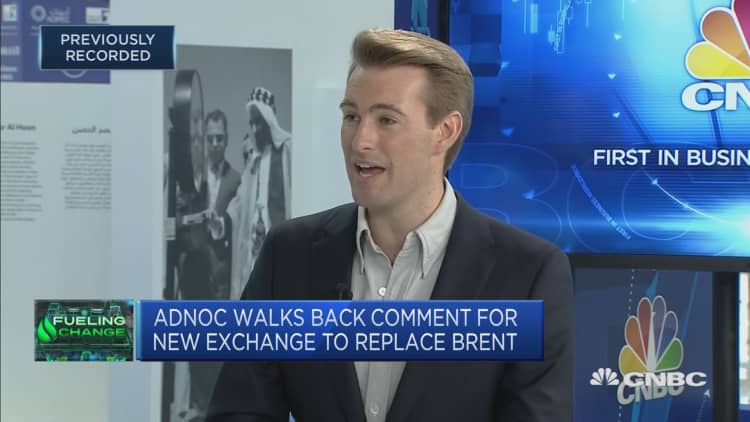The Abu Dhabi National Oil Company (Adnoc) and nine of the world's largest energy traders have partnered with the Intercontinental Exchange (ICE) to set up the world's first Murban crude oil futures contracts.
ICE Futures Abu Dhabi (IFAD) and ICE Murban futures are slated for launch in early 2020, subject to regulatory approvals, and will seek to rival well-established light crude oil benchmarks WTI and Brent.
Among the companies joining state-owned Adnoc, which produces around 1.7 million barrels of Murban crude daily, to take stakes in the new oil bourse are energy behemoths BP, Shell, Total, PetroChina and Vitol.
Murban is a light crude grade, a substantial proportion of which is exported from Fujairah via the Gulf of Oman, with Abu Dhabi's overall production currently standing at around 3 million barrels a day.
Adnoc Group CEO and UAE Minister of State Sultan Ahmed Al Jaber said in a statement Monday that "having a new, independent exchange in Abu Dhabi will not only benefit the UAE, but also physical and financial oil traders around the world."
IFAD will also be competing with the Dubai/Oman benchmark, operated by Dubai Mercantile Exchange (DME).
The development could shake up the pricing of oil in the region. While most Middle Eastern oil producers use rates in the futures market as a basis for oil pricing, Adnoc has historically priced retroactively.
"The futurization of Murban cargoes will act as a boon for buyers because it will allow them to know what they are paying in advance," Stephen Brennock, oil analyst at PVM Oil Associates, told CNBC on Monday.
"This is in contrast to the current retroactive pricing mechanism. What is more, buyers should now benefit from more hedging opportunities in the future markets."

Boon for buyers, but an uphill struggle
Vitol CEO Russell Hardy struck a similar tone at the Abu Dhabi International Exhibition & Conference (ADIPEC) on Monday, telling a press conference: "Murban already serves as a reference crude for many Asian refiners and the launch of this new benchmark will facilitate hedging and enable the development of a strong financial market which will benefit producers, consumers and traders."
However, Brennock told CNBC that in terms of becoming a global crude marker, the Murban futures contract faces an "uphill struggle."
"Previous attempts to launch a crude benchmark in the region have failed, most notably with the DME Oman futures," he said. The DME Oman Crude Oil Futures Contract has struggled to demonstrate to investors the deep liquidity needed to rival Brent and WTI, and achieved a considerably lower volume of traded contracts since its inception.
"I just don't think there is the appetite for another global crude benchmark. Accordingly, the Brent-WTI duopoly will continue to dominate the crude futures trading arena," Brennock added.




